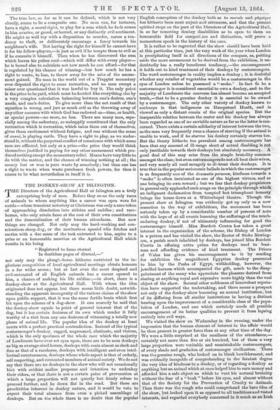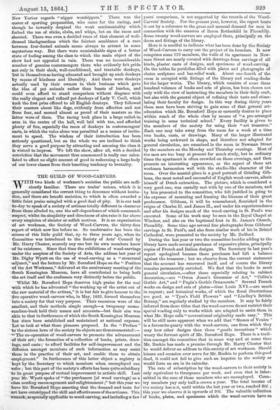THE DONKEY-SHOW AT ISLINGTON.
• THE Directors of the Agricultural Hall at Islington are a truly enterprising body of men. Before they arose the only races of animals to whom anything like a career was open were fat cattle—whose transient notoriety at Christmas was only a sure token --of approaching dissolution into sirloins and saddles ; and race- horses, who only attain fame at the cost of their own constitutions and the demoralization of their human attendants. But now things are changed. Not only may the hard-working and con- scientious sheep-dog, or the meritorious spaniel who fetches and carries with a due sense of the task entrusted to him, aspire to a prize or an honourable mention at the Agricultural Hall which results in his being " Registered to fame eternal In deathless pages of diurnal,—" not only may the plough -horse hitherto restricted to the in- glorious competition of local agricultural meetings obtain honours in a far wider arena ; but at last even the most despised and -evil-entreated of all English animals has a career opened to him, a chance of making his life sublime,—in short, there is a donkey-show at the Agricultural Hall. With whom the idea originated does not appear, but there seems little doubt, notwith- standing the apparent incongruity of the various claims of the show upon public support, that it was the same fertile brain which first hit upon the scheme of a dog-show. It can scarcely be said that the donkey-show equals in point of general interest that of the dog, but it has certain features of its own which render it fully worthy of a visit from any one desirous of witnessing a totally new phase of animal life. The popular idea of the donkey at least meets with a perfect practical contradiction. Instead of the typical costermonger's donkey, ragged, ungroomed, obstinate, and vicious, which is the only specimen of the whole race which the majority of Londoners have ever set eyes upon, there are to be seen donkeys as big as average-sized horses, donkeys with coats almost as sleek and fine as that of a racehorse, donkeys with-intelligent and even intel- lectual countenances, donkeys whose whole aspect is that of orderly, seltrespecting, and contented members of animal society. We do not say that there are no donkeys in the show who will not occasionally kick with evident malice prepense and intention to undonkey their riders, or that there is not a certain point of provocation at which a large proportion will not quietly but firmly refuse to proceed further, and lie down flat in the road. But these are proclivities inherent in donkey nature, and it would be vain to expect their total absence from even a picked assemblage of donkeys. But on the whole there is no doubt that the popular
English conception of the donkey both as to morale and physique has hitherto been most unjust and erroneous, and that the present spirited steps on the part of the Directors of the Agricultural Hall, in so far removing donkey disabilities as to open to them an honourable field for competition and distinction, will prove a momentous epoch in the history of the race.
It is rather to be regretted that the show should have been held at this particular time, just the very week of the year when London is precipitating itself in all directions of the compass, as, putting aside the mere amusement to be derived from the exhibition, it un- doubtedly has a really beneficent tendency,—the encouragement it holds out to kind treatment of their donkeys by costermongers. The word costermonger in reality implies a donkey ; it is doubtful whether any retailer of vegetables would be a costermonger in the eyes of London unless he possessed a " moke." In fact to be a costermonger it is considered essential to own a donkey, and to the majority of Londoners the converse has almost become an accepted truth,—that to be a genuine donkey it is essential to be owned by a costermonger. The only other variety of donkey known to cockneys is that indigenous on Hampstead Heath, and is viewed as only a distant cousin of the original species. But the inseparable relation between the coster and his donkey has always been regarded as one of no enviable nature as far as the latter is con- cerned. There exists a certain solidarity of interest between the two, as the man very frequently runs a chance of starving if the animal is unable to work, and if he starves his donkey certainly starves too. But the theory hitherto too prevalent among costermongers has been that any amount of ill-usage short of actual disabling is not only justifiable towards their donkeys but absolutely necessary. A good deal of this may arise from the simple brutality common amongst the class; but even coetermongersdo not all beat their wives, and very nearly all used savagely to ill-treat their donkeys. It is true that in the popular seriocomic ballads inwhich the costermonger is so frequently one of the dramatis persona;, kindness towards a "moke" is often inculcated as one of the highest virtues, and as one bringing its own reward ; but we fear that donkey proprietors in general only applauded such songs on the principle through which an indignant declamation from tempted but triumphant honesty brings the house down at a Whitechapel theatre. Though the present show at Islington was evidently got up only as a new sensation in the way of exhibitions, the movement has been seriously taken up by a considerable number of persons of note with the hope of at all events lessening the sufferings of the much- enduring donkey, if not of ultimately influencing for good the costermonger himself Miss Burdett Coutts has taken a great interest in the organization of the scheme, the Bishop of London is a patron and has visited the show, the Rector of Stoke Newing- ton, a parish much inhabited by donkeys, has joined Miss Burdett Coutts in offering extra prizes for donkeys used in busi- ness and affording evidence of kind treatment. The Prince of Wales has given his encouragement to it by sending for exhibition the magnificent Egyptian donkey presented to him by the Pasha of Egypt, withholding, however, the jewelled harness which accompanied the gift, much to the disap; pointment of the many who appreciate the pleasure derived from staring at anything royal and expensive more highly than the real object of the show. Several other noblemen of benevolent reputa- tion have supported the undertaking, and there seems a prospect not only of the donkey-show becoming an annual institution, but of its differing from all similar institutions in having a distinct bearing upon the improvement of a considerable class of the popu- lation of London, and one which certainly needs all possible encouragement of its better qualifies to prevent it from lapsing entirely into evil ways.
We visited the show on Wednesday in the evening, under the impression that the human element of interest in the affair would be then present in greater force than at any other time of the day_ We were a little surprised at the smallness of the attendance,— certainly not more than five or six hundred, but of them a very large proportion were veritable and unmistakable costermongers, of every shade and gradation of costermonger civilization. There was the genuine rough, who looked on in blank bewilderment, and was evidently incapable of comprehending in the faintest degree the very idea of kindness to a donkey, or of regarding a donkey as anything but an animal which at once helped him to earn money and afforded him a safe object on which to vent his natural brutality without the fear of a "beak " before his eyes, and almost without that of the Society for the Prevention of Cruelty to Animals. Then there was the rough who could comprehend the bare idea of the show, but looked upon it as opposed to all traditions and vested interests, and regarded everybody concerned in it much as an Irish New Yorker regards " nigger worshippers." There was the coster of sporting propensities, who came for the racing, and though he inwardly despised the weak sentimentality which forbad the use of sticks, clubs, and whips, bet on the races and shouted. There was even a decided trace of that element of well- dressed blackguardism which the faintest semblance of a race between four-footed animals seems always to attract in some mysterious way. But there were unmistakable signs of a better state of feeling among the class to which the main object of the show had not appealed in vain. There was no inconsiderable number of genuine costermongers there who evidently felt pride not only in their sleek, well-conditioned, and tractable donkeys, but in themselves as having educated and brought up such donkeys by means of kindness and liberality. And there were donkeys actually used by their owners in their business which gave the idea of pet animals rather than beasts of burden, and could even afford to stand comparison without disgrace with the really elegant and refined pet donkeys of Lady V. Cecil, which took the first prize offered to all English donkeys. They followed their masters about like dogs, evidently from affection and not from fear, and seemed almost as proud of their masters as the latter were of them. The racing took place in a large railed-in area in the centre of the hall, well laid with tan, and afforded plenty of fun, especially the races of donkeys in costermongers' carts, in which the voice alone was permitted as a means of incite- ment to speed. The wisdom of their introduction has been seriously questioned, but on the whole we are inclined to think they serve a good purpose by attracting and amusing the class it is wished to impress. We left the show, after all, with a decided conviction that the movement thus commenced is really one calcu- lated to effect no slight amount of good in redeeming a large body of our lower classes from their besetting tendency to brutality.































 Previous page
Previous page